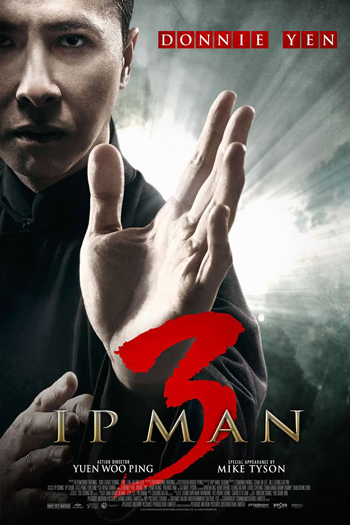By Eric Card
Northwest Asian Weekly

![]()
![]()
![]()
![]()
In the third and quite possibly the final installment of the Ip Man series, actor and martial artist Donnie Yen and director Wilson Yip team up once again for “Ip Man 3.” The series is loosely based on Yip Man (played by Donnie Yen), grandmaster of the martial art Wing Chun and teacher of the legendary Hong Kong martial artist Bruce Lee.
While the first two films revolve around the Japanese invasion of Fo Shan and British occupation of Hong Kong, respectively, this film involves an American property mogul named Frank (played by none other than boxer Mike Tyson) trying to forcibly buy up valuable land in Hong Kong. His plans coincidentally involve taking over Yip Man’s son’s school, immediately pulling Yen into action. Two other plot lines are interwoven, including a set of challenges for Yip Man’s family following tragic news and his prominence as the best Wing Chun martial artist being threatened. The cast is rounded out by Zhang Jin, who plays Cheung Tin-Chi, a displaced martial arts expert trying to open his own school to teach Wing Chun, and Lynn Hung, who plays Cheung Wing-shing, Yip Man’s wife.
With this story comes one of the central themes touched on in the series, the role of a grandmaster. Yip Man serves as a teacher of fighting techniques, moral virtues, and discipline, a leader and role model for the community, and a father and husband. Serving one role can sometimes affect and diminish the effectiveness of another. This is especially relevant when focusing on the relationship between Yip Man and his wife, which is one of the bright spots of the film. While the other two films have bigger cultural implications at stake, this film zooms in closer, and takes a more introspective look at Yip Man and his inner conflict in balancing his priorities. Between their chemistry and Jin’s measured and convincing performance, their struggles breathe life into the film.
While there’s heart to Ip Man 3, this is certainly not to say that the story is without its flaws. The main culprit is the seeming lack of an overarching plot to anchor the film. These interwoven plot lines serve more like separate episodes forced upon each other, leaving the audience to pick up the pieces and make sense of how they relate and affect one another. At one point, what was thought to be the main storyline seems to resolve and shifts the narrative to something completely different, as these separate occurrences are merely strung together by employing some of the same characters. As a result, the film at times can feel like a collection of martial arts battles, connected by scenarios that ultimately feel disjointed.
Despite all this, if there’s one thing that this film gets right, it’s the fight scenes. From a claustrophobic combat taking place in an elevator and narrow stairway, to showcasing the superiority between boxing and Wing Chun (also explored in Ip Man 2), to martial artists duking it out to see who carries the torch as the face of Wing Chun, this film delivers a wide range of styles and settings. Yuen Woo-Ping is the action choreographer this time around, taking over Sammo Hung’s duties from the first two films. Whereas the earlier films utilize an almost effortless, gravity-defying, and fluid style of fighting, Ip Man 3 takes a more furious and hard-hitting approach. On the surface level, this is a bit ironic as Woo-Ping is well-known as the choreographer of “Crouching Tiger, Hidden Dragon,” which uses a style that allows fighters to glide, soar, and hover. This film only proves his range and skill as the mastermind behind the action.
As hinted earlier, Ip Man 3 breaks away from the tone of its predecessors in the series. The theme of oppression, Chinese identity, and the ever-changing world is not as central in this film. In the earlier installments, Yip Man fights to maintain his traditional ways, culture, and morality through adversity and conflict. However, this film flips that idea and allows him to grow and reconcile with what’s left when all is said and done. One can certainly argue that this film is more character-driven than plot-driven, and as a result, the stakes around the action is not as high. And that’s okay.
But high stakes are what audiences want, it’s what has made prior Ip Man movies successful, and director Wilson Yip understands this. Thus, the stakes are raised, and it feels forced. It feels like plot points were rearranged to build up momentum. Motivations behind characters are at times confusing and contradicting, and seem to be dictated by the film’s attempts to make fight scenes matter more than they actually do. In the end, much like the protagonist, Ip Man 3 attempts to do too many things at once.
Eric Card can be reached at info@nwasianweekly.com.



